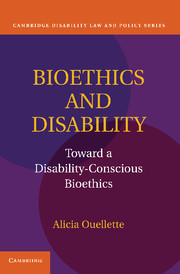2 - Clashing Perspectives and a Call for Reconciliation
Published online by Cambridge University Press: 07 June 2011
Summary
The events and issues that have precipitated and explain the emergence of bioethics as a scholarly field and a social movement differ in a fundamental way from the events and issues that have inspired and explain the emergence of disability studies as a scholarly field and disability activism as a social movement. As detailed in Chapter 1, the field of bioethics emerged largely in response to the perceived mistreatment of individuals by researchers and health care providers: experiments conducted without individual consent, medical procedures forced on or denied to individual patients, the denial of an organ to a particular person. To be sure, emerging technologies triggered a great deal of discussion and continue to broaden the scope of bioethical inquiry well beyond the realms of research and clinical medicine, but the focus of much bioethical discussion was and remains the appropriate use of particular medical interventions for particular individuals. By contrast, the disability rights movement formed largely in response to perceived mistreatment of the community as a whole: the purposeful elimination of people with disabilities from the human race, the systematic exclusion of persons with disabilities from employment and education, and the systematic devaluation of people with disabilities in popular culture. It is hardly surprising, then, that the movement's primary focus was and remains on community concerns. That is not to say that members of the disability community are not concerned with what happens to individuals – they are.
- Type
- Chapter
- Information
- Bioethics and DisabilityToward a Disability-Conscious Bioethics, pp. 47 - 71Publisher: Cambridge University PressPrint publication year: 2011



